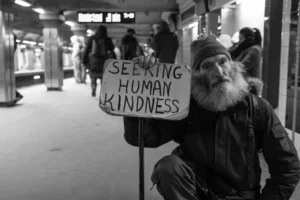My heart broke the day my mom told me she didn’t love my dad anymore. It was June, without a cloud in the sky on that hot Arizona day. After completing my sophomore year of college in California, I decided to go home for a weekend visit with my parents. As always, it was nice visiting my family, but at the same time something didn’t feel right. Shortly before I left to go back, my mom asked me to take a walk around our block. The walk was mostly silent, and then, without looking at me, she dropped the bomb.
I don’t love your dad anymore…
I’m not sure what to do about it…
I’m considering moving out…
My body felt numb. Was I dreaming? Her words repeated over and over in my head, but they wouldn’t sink into my heart. Stunned and silent, my only thought was “why?” — why in the world was this happening to my family? Filled with anger, I got in my car and drove back to California. I cried almost the entire way.
Our Past
You have to know some things about my family to understand why this came as an overwhelming shock. Up until this point, I believed I had a perfect family. I know that sounds unrealistic, but my friends constantly told me how lucky I was to have parents who raised my brother and me in a Christian home. They were surprised my parents were still married and that we actually did “family things” together. They said we resembled something out of a 1950s television show.
No matter the situation, Mom was an optimistic person. I learned the importance of selflessness through the countless times I saw her extend a hand to friends, elderly and the homeless. Dad had a wonderful sense of humor, and no matter how busy he was, he always went out of his way to help people. Their marriage was no different. They hardly ever fought, and often they would kiss and cuddle in front of my brother and me just so we would get embarrassed. Although I hardly acknowledged it, deep within I appreciated their example of love.
As I started to prepare for college, this normality of my parents’ life began to change. Mom often appeared distant and confused. Dad said she was having a “midlife crisis.” I had no idea what this meant, but to try and solve the problem, Mom moved out of our house for some time away. One month later she moved back in, yet the next two years became a familiar roller coaster. As a teenager I couldn’t comprehend what was inside her. All I saw was her walking farther away from God and Dad trying harder to stop her.
Divorce
After that walk around the block, Mom left again, only this time she never returned. Less than five months later, after 23 years of marriage, my parents were divorced. The people I had admired most throughout my life had broken my trust. As my life shattered to pieces, sorrow, anger and a feeling of betrayal filled my heart.
Unfortunately, stories like mine are becoming too common today — even among the well known. In a recent article, top Christian female singer Jaci Velasquez told of her parent’s recent breakup. When the interviewer noted how devastating it must have been, Jaci replied, “It was horrible. I secluded myself from everybody and everything, and was angry with God. I prayed, ‘How could you let this happen?’ I was sure it was my fault.” For years people have shown concern for young children when they suffer a parents’ divorce. But what if you’re a young adult, such as Jaci Velasquez, or myself, and your parents divorce? As a young woman you have enough to handle and adjust to in your life when abruptly you can be forced to deal with something you never expected, nor ever asked for. In my situation, I desired my reaction to be godly, but the divorce brought struggles I didn’t know how to handle emotionally, socially or spiritually. Following, are the five biggest struggles I encountered and the way God taught me to handle each one:
1. The Pain. Out of all my struggles, this was the deepest and most difficult one. There were nights I cried for hours. I couldn’t understand how this happened to my “perfect” family and why it had to hurt me so badly. Desperate for answers, I pored over the Bible and found that the emotions I felt — betrayal, fear, anger and hurt — Jesus felt, too. He felt betrayed when His close friend Peter denied knowing Him; He agonized in a garden over the pain of His coming death; His anger ushered forth as He drove merchants out of temple courts; and He hurt deeply for the people He would die for on the cross.
My heartache could have easily led me away from God, but instead I turned to Him and pressed on despite the pain. In return, His understanding of pain and the fact that He loved me comforted me and began to heal me.
2. Isolation. When difficult things happen in my life I tend to keep to myself. The problem with this is that I found myself feeling depressed and growing bitter because of the anger I held inside. Eventually I started talking to a couple of close friends. Sometimes I talked so much I was afraid my best friend was getting tired of hearing about my problems, but she reassured me that she wanted to be there for me no matter what. It’s important to remember not to isolate yourself from others. Talk with a trusted friend or adult and continue in your normal activities. Express your feelings because keeping them inside may cause bitterness and may damage your future relationships. Also consider recording your thoughts in a journal to God, honestly telling Him how you feel.
3. Who’s at Fault? Sometimes I wondered if the divorce was either my fault or God’s fault. Through the counsel of friends I realized the divorce was not my fault, nor God’s fault, but rather the product of a person’s sin. Humans are selfish and sometimes make selfish decisions, forcing others to deal with consequences of pain. Once I understood this, my anger turned to grief and I found myself on my knees asking God to help my parents with what they were going through. Don’t ever believe the lie that the divorce is your fault or that you should be able to somehow stop it.
4. Taking Sides. Although I knew my parents’ divorce was wrong, I couldn’t stop loving either one of them. My parents said they would never get me caught in the middle of their divorce, yet whenever conflict arose I felt obligated to either take a side or to somehow “keep the peace” in my family. I also found myself feeling responsible for their emotional well being. I learned that I couldn’t play referee or gossip to one parent about the other. This also involved being honest with my parents about my thoughts and feelings.
5. The Forgiveness Factor. Forgiveness is one struggle I still deal with today. After three years of heartache and confusion the pain hasn’t completely gone away. Once in a while a memory will pop into my head and I’ll feel anger toward my parents, knowing the scars will always remain. But just as Jesus forgave those who hurt Him, I am also called to forgive those who hurt me. Repeatedly in the New Testament God stresses the significance of forgiveness. To Him forgiveness is not an option, but rather a command of obedience. Because in any case forgiveness can be a challenge, I pray and ask God for strength. I ask Him to change my heart to be graceful toward others, just as He is graceful toward me. Daily as I choose to forgive and not become bitter; negative feelings flow away, and peace floods my heart.
Looking Ahead
I was married this past year, and while my relationship with my husband is amazing, sometimes I fear our marriage will end up like my parents’ marriage. But just as I had a choice in how I reacted to my parents’ divorce, I have a choice in how I will handle my marriage and my walk with God. When I go to prayer I ask God to heal families who are struggling to hold on and to keep families strong who are already grounded in Him. I ask Him to help me love, forgive and obey Him in all circumstances especially concerning my own family.
I won’t allow my parents’ divorce to destroy my new marriage or to destroy me. Rather, I will allow it to change me into a person who bears good fruit so in the end I will have joy and God will be glorified. Despite the pain and the past, with God, I can face the future. And so can you.
Copyright © 2002 Sandi Greene. All rights reserved. International copyright secured.









